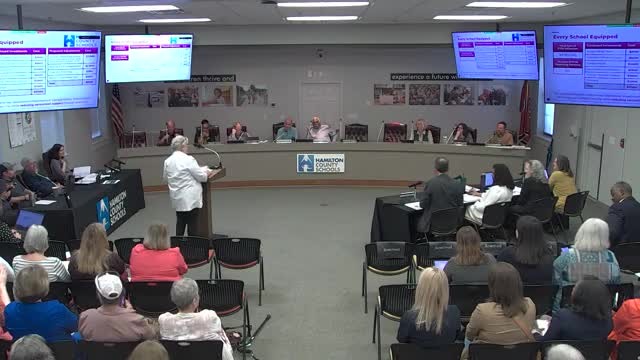Board debate erupts after administration proposes reducing PRN nurse spending to save about $412,000
Get AI-powered insights, summaries, and transcripts
Subscribe
Summary
The district proposed reducing PRN nurse pay to save roughly $412,000, prompting testimony from the district's school-health manager that PRNs cover hundreds of absence days and critical daily medical needs.
Hamilton County Schools' proposed budget options include eliminating or reducing PRN (per-diem/substitute) nursing pay—an item the administration estimates would save roughly $412,000, equivalent in the draft to about six full-time nurse FTEs.
Marissa Borgers, manager of school health programs, told the finance committee that PRN nurses are used to cover short-term absences and to support schools with very high medical needs. "If our kids are not healthy, they can't learn. They can't thrive," Borgers said, citing daily clinical work school nurses perform and specific incidents the district has managed this year: dozens of tube-feedings at some schools, emergency epinephrine administrations, hundreds of albuterol treatments and dozens of emergency seizure medications.
Borgers said the district has roughly 16 PRN nurses budgeted (each at part-time effort) and that the PRN pool covered more than 840 days of nurse absences this year, with the district able to cover about 90% of those days using current staffing and PRNs. The administration told the board that removing PRNs in the draft is one of many options to reach the multi-million-dollar gap; the PRN cut alone was shown as approximately $412,000 in reduced substitute/nurse pay, and the budget presentation noted those PRNs equate to about six full-time equivalents when aggregated.
Board members pressed staff on the safety and liability consequences of reducing PRN coverage. Board member Connor and others asked whether staff or volunteers could be assigned to administer medications when a nurse is not available; a participant in the discussion noted Tennessee law allows properly trained volunteers or staff to administer certain medications under a school's plan, but board members repeatedly said they are concerned about placing additional clinical duties on already overburdened office staff.
Administrators responded that the draft assumes there will be a licensed nurse assigned to every school on a regular basis, and that PRN nursing pools fill temporary gaps and provide additional coverage where a school has high-acuity medical needs. Borgers and nurse leadership emphasized they were not included in early-stage decisions about making PRNs a candidate for savings and urged the board to consider the clinical risks.
The committee heard several hard examples Borgers used to illustrate daily nurse responsibilities: tube feedings ("1 school does 10 tube feedings a day"), emergency bronchodilator treatments (she said the district had given 777 emergency albuterol treatments this year) and multiple emergency seizure medications. Borgers said she "does not feel good at all when I do not have enough to cover" and described instances where she personally filled in to cover nurse absences.
The administration characterized the PRN proposal as a conservative savings card and said it would put in place stricter processes for coverage and pairing schools to ensure students with ongoing medical needs are staffed with a nurse; staff also said they would return with more detailed coverage plans. No formal action or vote was taken on the PRN item during the meeting.
